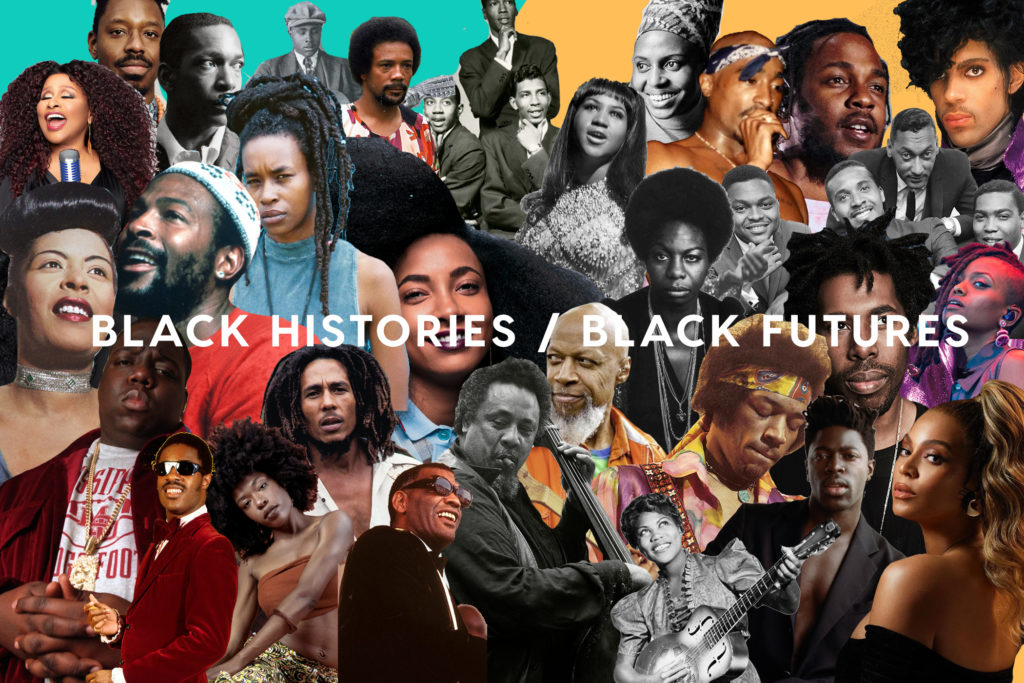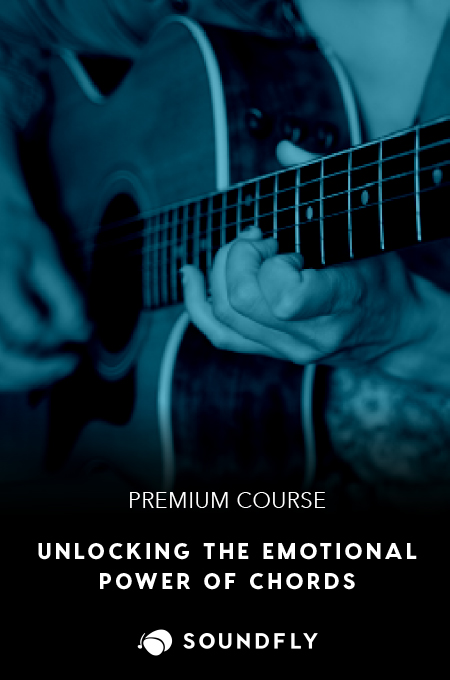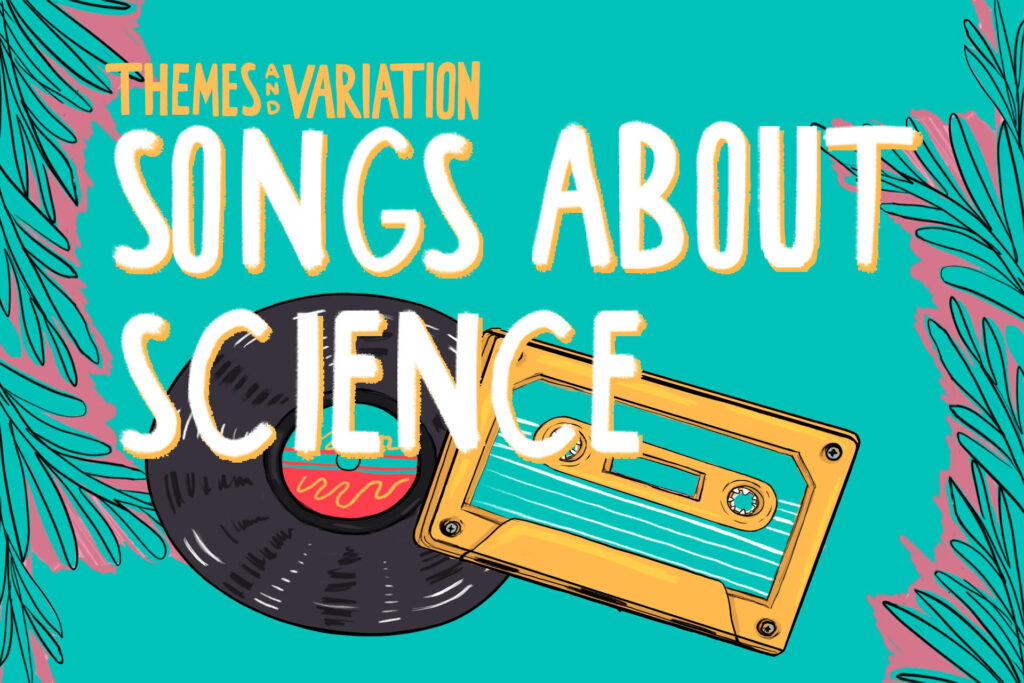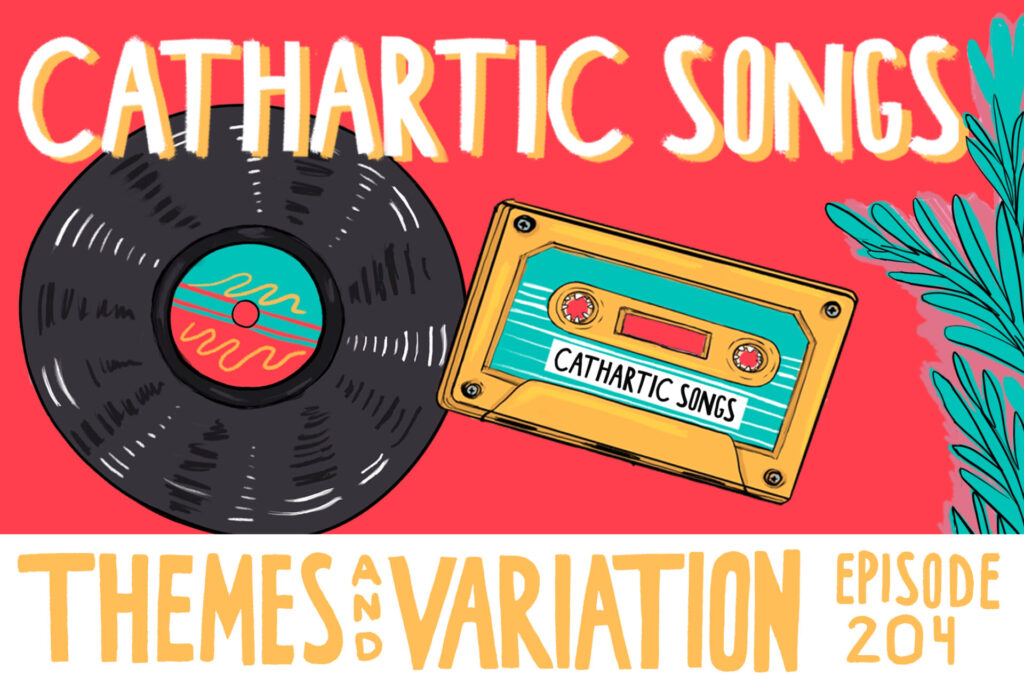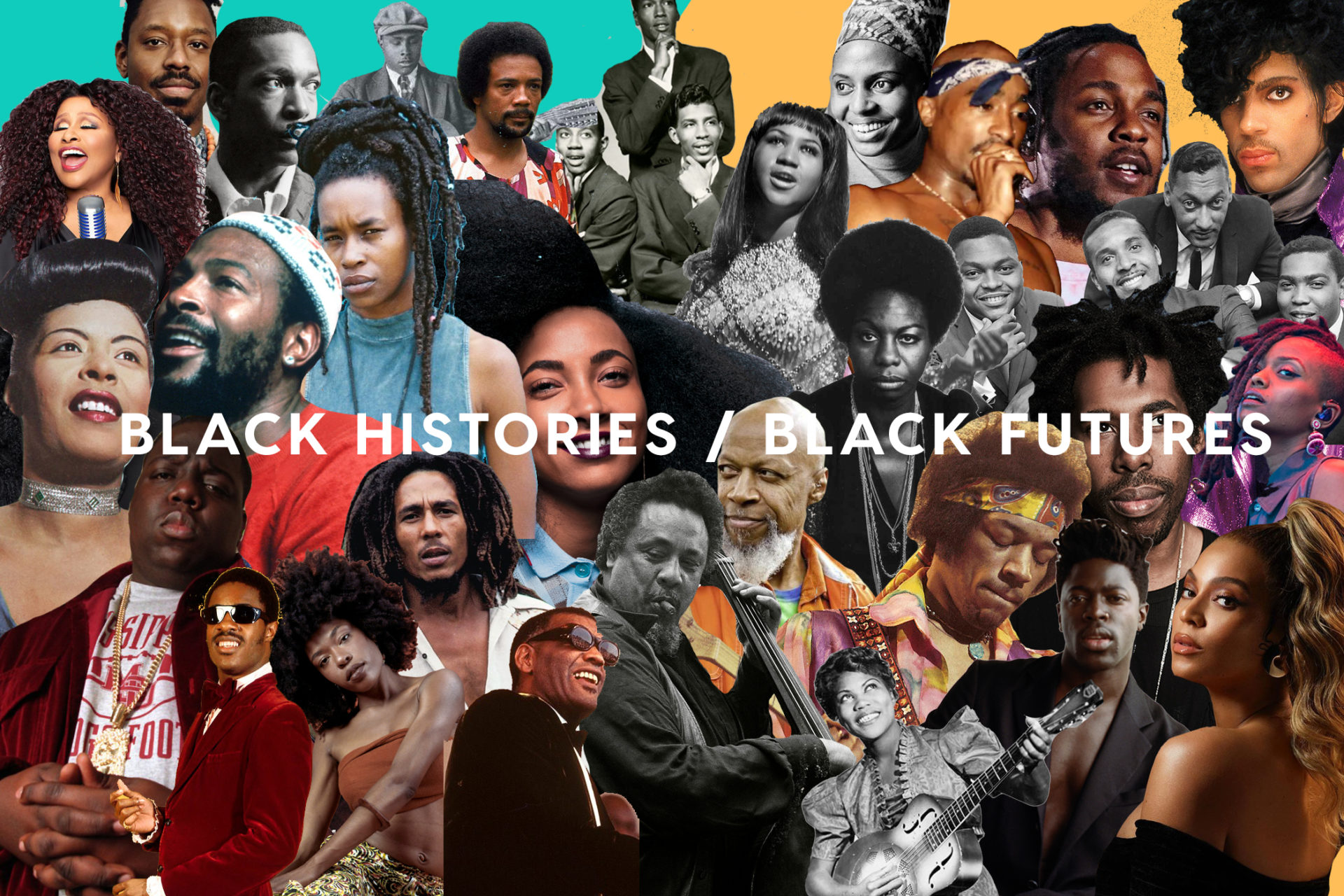
Today is the start of Black Music Month, and for us, it seems an obvious time to reflect on the tremendous legacy of Black American music that we draw on everyday in our work; and the amazing ways Black musicians continue to shape our relationship to and love of music.
For me personally, the truth here is really simple: The music I love, the music I make, and the music I listen to only exists because of the truly staggering accomplishments of countless Black American musicians, often in the face of extraordinary oppression, discrimination, and violence. We operate in the lee of their wind. It’s both humbling and inspiring.
Leading up to this month, we’ve been sharing amongst ourselves on the Soundfly Team songs by Black musicians that have had a big impact on us, as well as songs that illustrate some of the ways that legacy continues to shape us today and in the future. It’s one of those discussions that easily balloons out of control, so we made a few playlists that you can check out below.
But while taking part in this discussion, it struck me that this is largely a futile endeavor. And that’s because in so many ways “Black music” simply IS modern music. Almost every major genre you can point to today bears its imprint. Almost every element of music today draws on the innovations of Black musicians. So why even bother trying to consider Black music separately from “music?”
A few years ago, I was lucky enough to meet the Pulitzer Prize-winning poet Yusef Komunyakaa and interview him for a Soundfly course on the influences of the Blues. One of the things he said that stuck with me was: “I refuse to have a straightforward narrative, because I have to surprise myself. Otherwise, I don’t think I would write. It’s the same for the Blues singer. I don’t think the Blues singer would be singing if he or she was overly controlled.”
The early Blues music Yusef was talking about developed in part as a way to say one thing and signify something else, as a means for survival and freedom in the face of authority. It was a complex interplay between oppression, celebration, confrontation, and survival.
I think the story of modern music, particularly in the US, is one that eschews a straightforward narrative — but perhaps the defining feature has been the continual innovation of Black American musicians in defiance of the way people and systems in our country have too often treated them. The way countless musicians have chosen to communicate their narrative in ways surprising and complex, from Bourbon Street to Sedgwick Ave, has left our world richer and more full in a million ways. That’s the water we musicians swim in today, and for that, I’m unendingly grateful.
This month (and beyond), I hope we’re all able to spend some time absorbing and reflecting on the extraordinary legacy of so many amazing individuals and the ways in which their accomplishments continue to shape us today. And that’s why we’ve created these two team-generated playlists, Black Histories (which looks back on the artists who’ve paved the route to the present) and Black Futures (which looks ahead to the artists currently defining what the future of music might sound like).
I hope this music and the below commentary leaves you inspired to offer more beauty into the world and to support the continued struggle for racial equality around the country (and the world).
We’ve chosen a few of our favorites from the playlist, and you should do the same! If this article speaks to you, feel free to share some of your favorite Black Histories and Black Futures in the comments below.
~ Ian Temple, Founder & CEO
Carter Lee
John Coltrane – “Naima”
I read Ben Ratliff’s biography of John Coltrane (John Coltrane: The Story of a Sound) during a very formative period in my musical life. I was practicing what I thought was a lot, always in search of a sound to call my own. Studying Coltrane revealed that no one has probably ever worked harder than he did to develop his own voice on his instrument. A true titan of jazz and musical artistry in general. An artist that put in so much work, emotion, and relentless pursuit of perfection into their craft that they transcended music altogether.
Known at times for his “sheets of sound” approach, “Naima” offers possibly the most stunning look at Coltrane’s otherworldly approach to playing a ballad. Lyrical, sophisticated, and pure melody in every note.
Thundercat – “Them Changes”
Thundercat has taken the torch of the legendary improvisers that came before him and has added fuel to the flame. His ability to carve out an incredible career as a sideman turned singer/songwriter and bassist is no doubt due to his undeniable talent. Lots of players use chords on the bass, but he sees the instrument in an entirely different way. He is one of those ultra-rare artists that becomes one with their instrument, creating new ways of looking at an instrument that we thought everything had been done on.
“Them Changes” has been stuck in my head since it dropped in 2015, and I have no intention of letting it leave any time soon.
Mahea Lee
Nat King Cole – “Nature Boy”
The inimitable talent and artistic genius of Nat King Cole are recognized the world over, and with good reason. There are few voices, if any, that can soothe the soul quite like his does. “Nature Boy” is one of my favorite songs, and while I’ve heard many arrangements and performances of the piece, Cole’s is the one I treasure most. The rich timbre of his voice seems to rumble at a listener’s core, making it a perfect pairing for a melody that both haunts and entices.
Of course, Cole’s legacy extends far beyond his vocal prowess. With undeniable artistry and unrelenting courage, he faced a society rife with hatred and misunderstanding and shared with it the gift of music.
Michael Kiwanuka – “Love & Hate”
In spite of the fact that I find him to be a truly unique and incomparable artist, I hope, beg, and pray that Michael Kiwanuka’s work is indicative of music’s future. Every track on his second LP offers a bounty of the things I tend to value most as a listener — heart-wrenching vocals, tapestry-like arrangements, mesmerizing grooves, and lyrics that invite and at times, demand introspection. The title track, “Love & Hate,” is certainly one of my favorites. From the tone of the guitar that plays the opening notes to the tasteful vocal distortion as the song fades away, there’s so much to appreciate about this.
Everything from the sound of the kick to the way the groove evolves over the 7+ minute run time is just perfect. I can’t say enough good things about this track. In fact, I could go on for pages about the background vocals alone! However, knowing that I tend to be the most tediously verbose member of the Soundfly team, I’ll leave things there and let you experience the rest for yourself.
Ian Temple
Nina Simone — “Four Women”
This song woke me up to so much of what I love about music, quite simply. It’s defined by its repetitive and minimal groove — a syncopated rhythm repeated over and over again. Nina Simone’s vocals sit on top and plays with the percussiveness of the arrangement in a way that introduced me to the power of contrast. The arrangement builds over time. The repetition makes the changes and moments of power hit harder. I’ve never been one who really follows lyrics, but the way the music matches the intensity of the lyrics just grabs you.
Jlin – “Blue i”
Jlin’s minimalist groove created to accompany Wayne MacGregor’s dance piece, Autobiography, is where I hope music is headed. It’s experimental music but eminently danceable. It’s dance music but full of surprises and interesting samples. When we were working with her on our course for Soundfly, hearing about how she composes pieces one measure at a time really connected with me — and introduced this possible musical future where we don’t rely quite so much on loops all the time, but harness every possible subdivision for rhythmic or melodic variation.
Martin Fowler
Ella Fitzgerald & Louis Armstrong – “Summertime”
In a duet for the ages, this recording of “Summertime” embodies the very essence of expansiveness — from the lush and somber orchestral intro and foundation, to Louis Armstrong’s unmistakable trumpet tone and no-nonsense delivery, on through to Ella Fitzgerlad’s seemingly effortless flights through George and Ira Gershwin’s gorgeous melodies and lyrical poetry. First hearing this recording early in my knowledge and understanding of music, I found the whole listening experience to be other-worldly.
Opening with the heavy, almost humid sound of slow parallel minor six chords evokes a sort of fever dream, while the form was also one of my first introductions to a variation on a minor blues, and what I learned was an extremely classic one, at that. Each melodic vocal run, each orchestrated flourish, each dynamic bloom felt so intricate and nuanced, yet never felt over-complicated or unintelligible — it’s a level of clarity I strive to achieve in my own compositions, arrangements, and even mixes to this very day.
From storyline to musical foundation, “Summertime” and the whole Porgy and Bess suite is deeply and intimately rooted in Black American culture, stories, and delivery, from a couple of the greatest Black American musicians to ever do it.
Noname – “Diddy Bop” (feat. Cam O’bi & Raury)
Noname keeps catching my ear on favorites and best-of playlists of friends of mine, consistently delivering heavy and complex lyrical rhythms and concepts, on top of harmonically alluring and forward-thinking beat foundations that function as earworms all on their own, but never outshining the strong voice at the center of it all. She’s first and foremost a preacher of high truths of humanity, of existence, and especially of the harsh realities of life as a Black American in the age of White supremacist patriarchal capitalism.
She holds no punches and makes no qualms about her staunch anti-capitalist, heavy-left, humanity-first philosophy, all of which infuses her brilliant lyricism. Her tracks evoke a sense that she just might be a soul from the socially evolved future, and here to share with us a vision of where we could be, if only we learn to listen a little deeper and open our eyes a little wider to the world around us. Picking a single track of hers is like picking the best petal off a rose, but a great place to start is always “Diddy Bop.”
John Hull
Sly and The Family Stone – “Family Affair”
We use drum machines every day now and don’t think twice about it. I didn’t know this track’s historical significance until we made our Beat Making in Ableton Live course with Dan Freeman a few years back. Sly and The Family Stone’s “Family Affair” was the first number one hit to feature a drum machine — The Maestro Rhythm King MRK-2. Sly Stone introduced the world to how important electronic drums would become for the fabric of the next 50+ years of music.
Kamasi Washington – “Street Fighter Mas”
This track immediately hooks you with a deep groove and interesting bass tone. The progression has a defiant, uplifting feeling, but when the epic choir comes in, there’s a sense of melancholy bubbling up at the same time from the choir that sounds like it’s straight from a classic western and R&B tune at the same time. “Street Fighter Mas” is a perfect example of all the disciplines Kamasi Washington fuses to create his music. Kamasi’s music seems to take all the things that so many different groups and ages of people love about different genres of music and combines them in a way that feels like it’s leading us towards new musical destinations.
Jeremy Young
Martha Reeves – “My Man (You Changed My Tune)”
Martha Reeves was the lead singer of the immensely popular Motown group, Martha and the Vandellas, most well known for their hit song, “Dancin’ in the Street.” The Vandellas started out as gospel-influenced backup singers and eventually became mega-stars with Reeves in the spotlight, but I’ve always regarded Reeves’ solo career as much more impressive – and this self-titled record from 1974 is a perfect example. Marta Reeves is wall-to-wall solid gold, no compromises, dialed to 11 emotionality and epic diva energy. But it’s also nothing like the soft-edged girl group stuff; the songs on this album run from clanky honky tonk to power disco, and sultry country ballads to organ-drenched, full-throated gospel.
Reeves doesn’t give a shit if you were expecting the smooth harmonies of her previous records, she’s larger than life and you better be standing and clapping in the pews or else get out the church! I love this song, “My Man (You Changed My Tune)” because it starts relatively slow but builds to this climactic peak and I’m pretty sure they had to turn down Reeves’ mic or she would’ve broken all the glass in the studio.
Nobody’s having more fun than Martha, and she wants you to know it. Just watch her tear it down during the Super Bowl XXXII Motown Half-Time Show!
Mourning [A] BLKstar – “If I Can If I May”
I saw this band by accident one night in 2018, and then I volunteered to do the door for their show when they came back to town later that same year. Let me tell you something, there’s never been a band like this in the history of music. Maybe Sun Ra’s Arkestra or Sly’s Family Stone band at their peak psychedelic deconstructions of soul music. Self-described as “a multi-generational, gender and genre non-conforming amalgam of Black Culture dedicated to servicing the stories and songs of the apocalyptic diaspora,” Mourning [A] BLKstar sounds like they left Earth in 1975 for Jupiter and landed back in Cleveland last Saturday night to a packed house. A big band influenced by jazz, hip-hop, gospel, soul, avant-garde minimalism and drone, their explosive performances feature off-time loops and shuffling samples, live-programmed drum machines and live instruments, group vocals, dissonance, and storytelling via extended soliloquies.
It gives me hope for whatever’s to come, and something tells me they’ll be right there at the forefront of whatever does…
Zoë Young
Nina Simone – “To Be Young, Gifted, and Black”
This pick was cemented for me watching Questlove’s new(ish) documentary Summer of Soul, where he pieced together largely unseen archival footage of one of the biggest musical gatherings of the last century, 1969’s Harlem Cultural Festival. I’ve long been a fan of Nina Simone, but watching her perform, with the added context of so many of her contemporaries, drove home to me how her music and persona have influenced the culture ever since. The way that she was so wholly and unapologetically herself felt revelatory for someone who was both a woman and Black.
The presence, activism, and musicality that she commanded has proven to be so important and permission-giving to the artists who have come after her. Simone reflected on writing “To Be Young, Gifted, and Black” in her autobiography, saying, “I felt more alive then than I feel now because I was needed, and I could sing something to help my people.” And while I’d argue that she is equally needed now, it is indisputable that Black history needed Nina Simone.
Lizzo – “Truth Hurts”
I recognize that this selection — originally released in 2017 — outs me as an out-of-touch elder millennial… But there is so much about Lizzo that breaks the mold of what we’ve come to expect from our pop stars that it makes me excited for the direction pop is going to move in her wake. There is the obvious — she doesn’t look like a traditional pop star and she owns that in an empowering way. She’s a virtuosic instrumentalist — a flutist of all things. And though blending hip-hop and pop is nothing new, her form of rapping fits so seamlessly in pop music that it’s indicative of how hip-hop is (or at least can be) pop now.
But the reason this song stuck out to me was that it essentially came from TikTok. Lizzo released “Truth Hurts” in 2017 as a single to little attention. But after going viral as a sound on TikTok, it was included as a bonus track on the deluxe edition of her hit album Cuz I Love You. Much has been written about TikTok’s influence on pop music — this article is a must-read if you want to dig deeper — but the takeaways tend to be that pop songs are moving towards being just a combination of 20-second clips, jumping from one hook into another.
And “Truth Hurts” demonstrates in an optimistic way that you can write music that can both appeal to new forms of media, while also being cohesive songs. The future of pop doesn’t need to be just 20-second TikTok sounds or fun radio hits that tell a story. We can have both.
Thanks for reading, thanks for listening.
